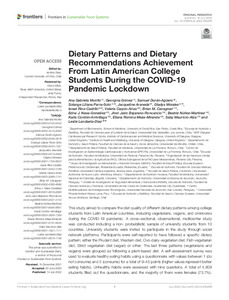Por favor, use este identificador para citar o enlazar este ítem:
https://repositorio.uca.edu.ar/handle/123456789/14721| Título: | Dietary patterns and dietary recommendations achievement from Latin American college students during the COVID-19 pandemic lockdown | Autor: | Murillo, Ana Gabriela Gómez, Georgina Durán Agüero, Samuel Parra Soto, Solange Liliana Araneda, Jacqueline Morales, Gladys Ríos Castillo, Israel Carpio Arias, Valeria Cavagnari, Brian M. Nava González, Edna J. Bejarano Roncancio, Jhon J. Núñez Martínez, Beatriz Cordón Arrivillaga, Karla Meza Miranda, Eliana Romina Mauricio Alza, Saby Landaeta Díaz, Leslie |
Palabras clave: | DIETA; ALIMENTACION; ESTUDIANTES UNIVERSITARIOS; PANDEMIA; AISLAMIENTO SOCIAL, PREVENTIVO Y OBLIGATORIO | Fecha de publicación: | 2022 | Editorial: | Frontiers Media | Cita: | Murillo, A.G., et al. Dietary patterns and dietary recommendations achievement from Latin American college students during the COVID-19 pandemic lockdown [en línea]. Frontiers in Sustainable Food Systems. 2022, 6 doi:10.3389/fsufs.2022.836299 Disponible en: | Resumen: | Abstract: This study aimed to compare the diet quality of different dietary patterns among college students from Latin American countries, including vegetarians, vegans, and omnivores during the COVID-19 pandemic. A cross-sectional, observational, multicenter study was conducted including a non- probabilistic sample of university students from 10 countries. University students were invited to participate in the study through social network platforms. Participants were self-reported to have followed a specific dietary pattern; either the Prudent diet, Western diet, Ovo-dairy-vegetarian diet, Fish-vegetarian diet, Strict vegetarian diet (vegan) or other. The last three patterns (vegetarians and vegans) were grouped as following a plant-based diet. A self-assessment survey was used to evaluate healthy eating habits using a questionnaire with values between 1 (do not consume) and 5 (consume) for a total of 9–45 points (higher values represent better eating habits). Unhealthy habits were assessed with nine questions. A total of 4,809 students filled out the questionnaire, and the majority of them were females (73.7%). A high percentage have been in lockdown for more than 5 months and were in lockdown when the survey was released. 74.3% were self-reported to follow a prudent diet, while 11.4% reported following a western dietary pattern and 8.8% a plant-based diet. When compliance with healthy and unhealthy dietary habits was analyzed, although all groups had low compliance, the plant-based diet group (56.09 ±6.11) performed better than the Western diet group (48.03 ± 5.99). The total diet quality score was significantly higher for plant-based diet followers, who also tended to better achieve the recommendations than omnivorous students, especially the ones following a western diet. These results present evidence that young adults such as college-aged students have unhealthy dietary habits. However, the ones who follow a plant-based diet such as vegetarians and vegans exhibit better scores and healthier dietary conducts. | URI: | https://repositorio.uca.edu.ar/handle/123456789/14721 | ISSN: | 2571-581X | Disciplina: | MEDICINA | DOI: | 10.3389/fsufs.2022.836299 | Derechos: | Acceso abierto | Fuente: | Frontiers in Sustainable Food Systems. 2022, 6 |
| Aparece en las colecciones: | Artículos |
Ficheros en este ítem:
| Fichero | Descripción | Tamaño | Formato | |
|---|---|---|---|---|
| dietary-patterns-dietary.pdf | 342,52 kB | Adobe PDF |  Visualizar/Abrir |
Visualizaciones de página(s)
66
comprobado en 27-abr-2024
Descarga(s)
47
comprobado en 27-abr-2024
Google ScholarTM
Ver en Google Scholar
Altmetric
Altmetric
Este ítem está sujeto a una Licencia Creative Commons

